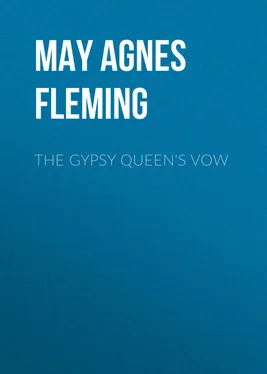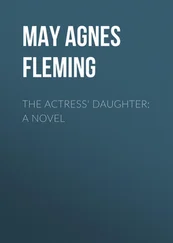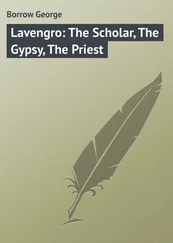May Fleming - The Gypsy Queen's Vow
Здесь есть возможность читать онлайн «May Fleming - The Gypsy Queen's Vow» — ознакомительный отрывок электронной книги совершенно бесплатно, а после прочтения отрывка купить полную версию. В некоторых случаях можно слушать аудио, скачать через торрент в формате fb2 и присутствует краткое содержание. Издательство: Иностранный паблик, Жанр: foreign_antique, foreign_prose, foreign_sf, на английском языке. Описание произведения, (предисловие) а так же отзывы посетителей доступны на портале библиотеки ЛибКат.
- Название:The Gypsy Queen's Vow
- Автор:
- Издательство:Иностранный паблик
- Жанр:
- Год:неизвестен
- ISBN:нет данных
- Рейтинг книги:4 / 5. Голосов: 1
-
Избранное:Добавить в избранное
- Отзывы:
-
Ваша оценка:
- 80
- 1
- 2
- 3
- 4
- 5
The Gypsy Queen's Vow: краткое содержание, описание и аннотация
Предлагаем к чтению аннотацию, описание, краткое содержание или предисловие (зависит от того, что написал сам автор книги «The Gypsy Queen's Vow»). Если вы не нашли необходимую информацию о книге — напишите в комментариях, мы постараемся отыскать её.
The Gypsy Queen's Vow — читать онлайн ознакомительный отрывок
Ниже представлен текст книги, разбитый по страницам. Система сохранения места последней прочитанной страницы, позволяет с удобством читать онлайн бесплатно книгу «The Gypsy Queen's Vow», без необходимости каждый раз заново искать на чём Вы остановились. Поставьте закладку, и сможете в любой момент перейти на страницу, на которой закончили чтение.
Интервал:
Закладка:
May Agnes Fleming
The Gypsy Queen's Vow
CHAPTER I.
NIGHT AND STORM
“The night grows wondrous dark; deep-swelling gusts
And sultry stillness take the rule by turn,
While o’er our heads the black and heavy clouds
Roll slowly on. This surely bodes a storm.”
Overhead, the storm-clouds were scudding wildly across the sky, until all above was one dense pall of impenetrable gloom. A chill, penetrating rain was falling, and the wind came sweeping in long, fitful gusts – piercingly cold; for it was a night in March.
It was the north road to London. A thick, yellow fog, that had been rising all day from the bosom of the Thames, wrapped the great city in a blackness that might almost be felt; and its innumerable lights were shrouded in the deep gloom. Yet the solitary figure, flitting through the pelting rain and bleak wind, strained her eyes as she fled along, as though, despite the more than Egyptian darkness, she would force, by her fierce, steady glare, the obscure lights of the city to show themselves.
The night lingered and lingered, the gloom deepened and deepened, the rain plashed dismally; the wind blew in moaning, lamentable gusts, penetrating through the thick mantle she held closely around her. And still the woman fled on, stopping neither for wind, nor rain, nor storm – unheeding, unfeeling them all – keeping her fierce, devouring gaze fixed, with a look that might have pierced the very heavens, on the still far-distant city.
There was no one on the road but herself. The lateness of the hour – for it was almost midnight – and the increasing storm, kept pedestrians within doors that cheerless March night. Now and then she would pass cottages in which lights were still glaring, but most of the houses were wrapped in silence and darkness.
And still on, through night, and storm, and gloom, fled the wanderer, with the pitiless rain beating in her face – the chill blasts fluttering her thin-worn garments and long, wild, black hair. Still on, pausing not, resting not, never removing her steadfast gaze from the distant city – like a lost soul hurrying to its doom.
Suddenly, above the wailing of the wind and plashing of the rain, arose the thunder of horses’ hoofs and the crash of approaching carriage wheels. Rapidly they came on, and the woman paused for a moment and leaned again a cottage porch, as if waiting until it should pass.
A bright light was still burning in the window, and it fell on the lonely wayfarer as she stood, breathing hard and waiting, with burning, feverish impatience, for the carriage to pass. It displayed the form of a woman of forty, or thereabouts, with a tall, towering, commanding figure, gaunt and bony. Her complexion was dark; its naturally swarthy hue having been tanned by sun and wind to a dark-brown. The features were strong, stern, and prominent, yet you could see at a glance that the face had once been a handsome one. Now, however – thin, haggard, and fleshless, with the high, prominent cheek-bones; the gloomy, overhanging brows; the stern, set, unyielding mouth; the rigid, corrugated brow; the fierce, devouring, maniac, black eyes – it looked positively hideous. Such eyes! – such burning, blazing orbs of fire, never was seen in human head before! They glowed like two live coals in a bleached skull. There was utter misery, there was despair unspeakable, mingled with fierce determination, in those lurid, flaming eyes. And that dark, stern terrific face was stamped with the unmistakable impress of a despised, degraded race. The woman was a gipsy. It needed not her peculiar dress, the costume of her tribe, to tell this, though that was significant enough. Her thick, coarse, jet-black hair, streaked with threads of gray, was pushed impatiently off her face; and her only head-covering was a handkerchief of crimson and black silk knotted under her chin. A cloak, of coarse, red woolen stuff, covered her shoulders, and a dress of the same material, but in color blue, reached hardly to her ankles. The brilliant head-dress, and unique, fiery costume, suited well the dark, fierce, passionate face of the wearer.
For an instant she paused, as if to let the carriage pass; then, as if even the delay of an instant was maddening, she started wildly up, and keeping her hungry, devouring gaze fixed on the vision of the still unseen city, she sped on more rapidly than before.
CHAPTER II.
MR. TOOSYPEGS
“He bears him like a portly gentleman;
And, to say truth, Vernon brags of him
To be a virtuous and well-governed youth.”
The vehicle that the gipsy had heard approaching was a light wagon drawn by two swift horses. It had two seats capable of holding four persons, though the front seat alone was now occupied.
The first of these (for his age claims the precedence) was a short, stout, burly, thick-set, little man, buttoned up in a huge great-coat, suffering under a severe eruption of capes and pockets. An immense fur cap, that, by its antediluvian looks, might have been worn by Noah’s grandfather, adorned his head, and was pulled so far down on his face that nothing was visible but a round, respectable-looking bottle-nose, and a pair of small, twinkling gray eyes. This individual, who was also the driver, rejoiced in the cognomen of Mr. Bill Harkins, and made it his business to take belated wayfarers to London (either by land or water), when arriving too late for the regular conveyances. On the present occasion his sole freight consisted of a young gentleman with a brilliant-hued carpet-bag, glowing with straw-colored roses and dark-blue lilies, rising from a back-ground resembling London smoke. The young gentleman was a very remarkable young gentleman indeed. He was exceedingly tall and thin, with legs like a couple of pipe-stems, and a neck so long and slender that it reminded you of a gander’s, and made you tremble for the safety of the head balanced on such a frail support. His hair and complexion were both of that indefinite color known to the initiated as “whity brown” – the latter being profusely sprinkled with large yellow freckles, and the former as straight and sleek as bear’s grease could make it. For the rest, he was characterized by nothing in particular, but for being the possessor of a pair of large, pale-blue eyes, not remarkable for either brilliancy or expression, and for wearing the meekest possible expression, of countenance. He might have been eighteen years old, as far as years went; but his worldly wisdom was by no means equal to his years.
“By jingo! that ’ere was a blast!” said Mr. Harkins, bending his head as a gale swept shrieking by.
“Yes, it does blow, but I don’t mind it – I’m very much obliged to you,” said the pale young man, with the white hair and freckles, holding his carpet-bag in his arms, as if it were a baby.
“Who said you did?” growled Bill Harkins. “You’ll be safe in Lunnon in half an ’our, while I’ll be a-drivin’ back through this ’ere win’ and rain, getting wetted right through. If you don’t mind it, I does, Mr. Toosypegs.”
“Mr. Harkins,” said Mr. Toosypegs, humbly, “I’m very sorry to put you to so much trouble, I’m sure, but if two extra crowns – ”
“Mr. Toosypegs,” interrupted Mr. Harkins, with a sudden burst of feeling, “give us yer hand; yer a trump. It’s easy to be perceived, them as is gentlemen from them as isn’t. You’re one o’ the right sort; oughter to be a lord, by jingo! Get up, hold lazybones,” said Mr. Harkins, touching the near-wheeler daintily with his whip.
“Mr. Harkins, it’s very good of you to say so, and I’m very much obliged to you, I’m sure,” said Mr. Toosypegs, gratefully; “but, at the same time, if you’ll please to recollect. I’m an American, and consequently couldn’t be a lord. There aren’t any lords over in America, Mr. Harkins; though if there was, I dare say I would be one. It’s real kind of you to wish it, though, and I’m much obliged to you,” added Mr. Toosypegs, with emotion.
Читать дальшеИнтервал:
Закладка:
Похожие книги на «The Gypsy Queen's Vow»
Представляем Вашему вниманию похожие книги на «The Gypsy Queen's Vow» списком для выбора. Мы отобрали схожую по названию и смыслу литературу в надежде предоставить читателям больше вариантов отыскать новые, интересные, ещё непрочитанные произведения.
Обсуждение, отзывы о книге «The Gypsy Queen's Vow» и просто собственные мнения читателей. Оставьте ваши комментарии, напишите, что Вы думаете о произведении, его смысле или главных героях. Укажите что конкретно понравилось, а что нет, и почему Вы так считаете.












